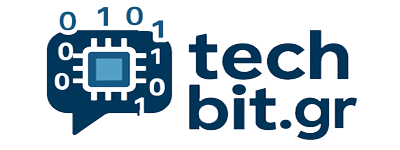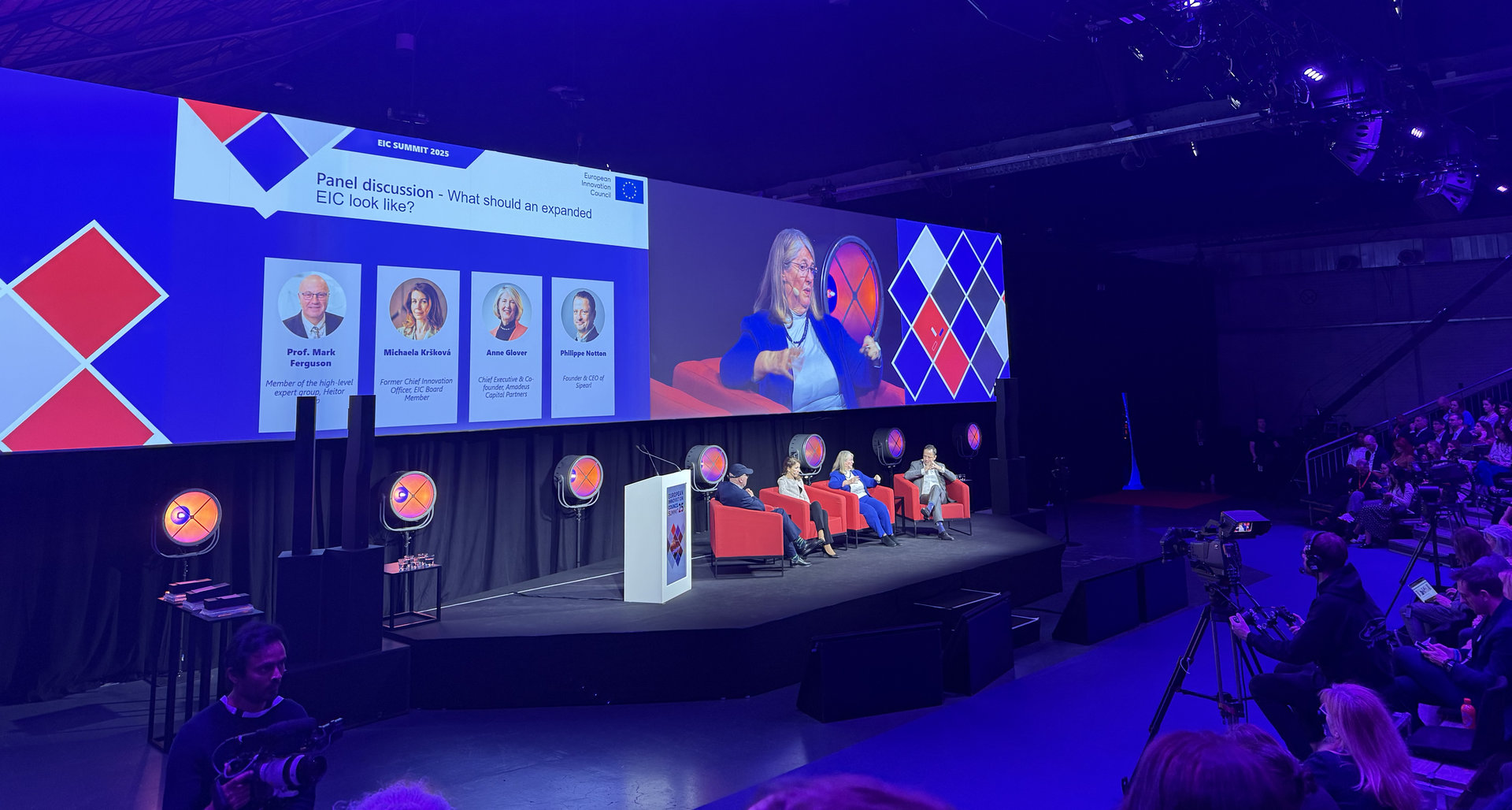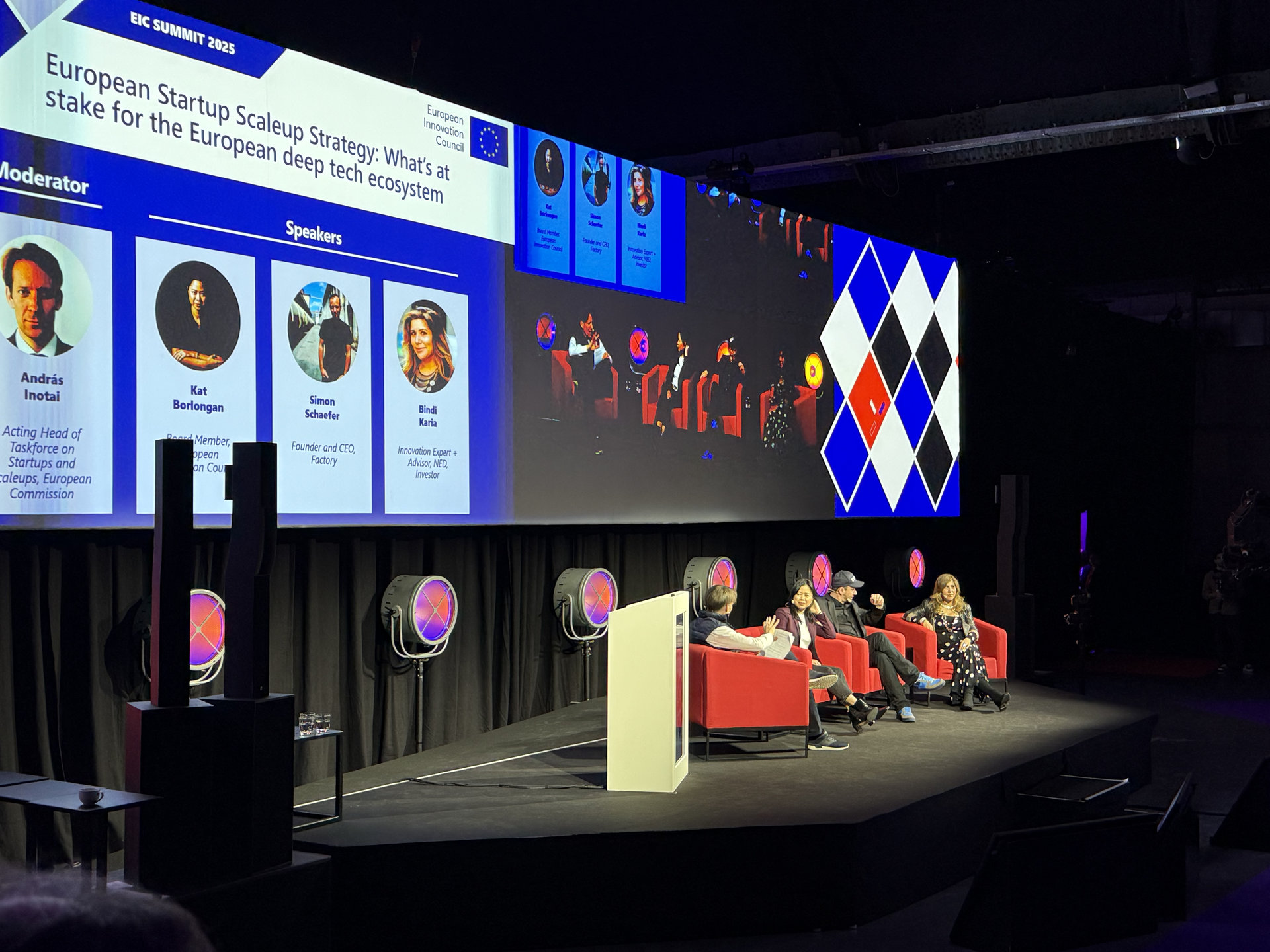The European Innovation Council (EIC) Summit took place in Brussels on April 2nd and 3rd, 2025. This significant event brought together key figures from across the European innovation landscape, including policymakers, entrepreneurs, researchers, and investors, to discuss how Europe can strengthen its position as a global innovation leader. As an attendee and jury member for the EU Prize for Women Innovators, I closely followed the various sessions and observed a strong focus on identifying the challenges and the opportunities for growth within Europe’s innovation ecosystem.
Numerous important discussions and presentations took place throughout the summit, offering valuable insights into the path forward. I tried to synthesize the key takeaways from these conversations, drawing upon the expertise shared during the opening remarks, the European Innovation Procurement Award Ceremony, Mayor Carlos Moedas’ press conference, and the strategic panel discussions concerning the EIC’s future and the European startup and scaleup environment.
A central and recurring theme, introduced by Anita Krohn Traaseth, Chair of the Board of Startup Norway and an EIC Board Member, was the need for Europe to adopt a mindset that grants it “permission to misbehave.” This concept advocated not for irresponsible action but a more agile, risk-tolerant, and forward-thinking approach to fostering innovation that encourages breaking free from traditional constraints to achieve significant impact. This core idea provided a framework for the subsequent discussions on crucial topics such as funding mechanisms, regulatory frameworks, the development of supportive ecosystems, and Europe’s competitive standing on the global stage.
“Permission to misbehave”
Anita Krohn Traaseth delivered a powerful call for a shift in mindset and approach early in the EIC Summit. In her opening remarks, she immediately established the EIC as a unique and evolving entity, stating, “The EIC is a startup in a very complex structure.” This framing acknowledged the inherent complexities of fostering innovation within established bureaucratic systems and emphasized the need for an iterative and adaptive journey. Krohn advocated for patience and the crucial role of feedback from innovators in shaping the EIC’s trajectory, noting that “we are testing and labbing this as we go.”
However, the core of Krohn’s message, the resonant phrase that echoed throughout the summit, was the imperative for Europe to grant itself “permission to misbehave.” This was not a suggestion for chaotic or irresponsible actions. Instead, it was a compelling call to break free from conventional limitations, to cultivate a greater appetite for risk-taking, and to prioritize a leadership-oriented approach over mere administrative management. Krohn lauded the initial visionaries who conceived the EIC and the dedicated efforts of the ESMA in bringing it to life. Her aspiration was clear: to inspire attendees to embrace this spirit of unconventional thinking, hoping they would leave with the conviction, “We learned to misbehave. Anita Krohn told you so.” She underscored the power of unexpected actions in driving memorable and impactful change, a belief rooted in her personal experience that “it’s the unexpected things you do that people remember.”
This philosophy of bold action and a willingness to deviate from the norm was further reinforced during the European Innovation Procurement Award Ceremony by Jean-David Malo. He highlighted the strategic significance of innovation procurement as a potent instrument for enacting real-world change across sectors like healthcare and transportation. Directly echoing Krohn’s sentiment, Malo stressed the necessity for “boldness, collaboration, and a shared commitment to do things differently, to misbehave” as essential ingredients for achieving truly transformative innovation through public sector purchasing.
The current state of the European innovation ecosystem
During his press conference at the EIC Summit, Carlos Moedas, the Mayor of Lisbon, offered a candid assessment of the current state of European innovation. He began by highlighting a significant inherent strength: Europe’s robust foundation in science and research. Moedas emphasized that Europe is a global magnet for intellectual talent, attracting top scientific minds from powerhouses like the United States and China. He argued that this deep well of scientific knowledge represents a crucial asset upon which to build future innovation.
However, Moedas also pointed to a persistent challenge: the often-difficult translation of this scientific excellence into tangible economic and societal impact. He articulated this as a gap between “creating knowledge” (science) and “turning that knowledge into money” – into marketable products, thriving companies, and new jobs. This struggle to effectively commercialize groundbreaking research and scale innovative ventures represents a key area where Europe needs to improve its performance.
Further insights into the current state were provided during the panel discussion on the European Startup and Scaleup Strategy. While Commissioner Michael McGrath, in his video message to this panel, underscored the European Commission’s commitment to enhancing the business environment for innovative companies, the discussion also highlighted existing hurdles. A significant challenge identified was the persistent regulatory complexities and bureaucratic obstacles that impede growth, particularly the cross-border expansion of European startups and scaleups. These complexities were seen as creating friction and unnecessary costs for companies aiming to scale their operations across the diverse regulatory landscape of the European Union.
The same panel also addressed the critical issue of talent. Kat Borlongan, Chief Impact Officer at Contentsquare and an EIC Board Member, pointed out that while Europe boasts a strong pool of graduates in science, technology, engineering, and mathematics (STEM) fields, a significant gap exists in the availability of experienced talent capable of navigating the challenges of scaling a startup into a large, globally competitive enterprise. This shortage of individuals with proven experience in scaling from the tens to hundreds or even thousands of employees was identified as a bottleneck for the growth ambitions of many promising European ventures.
In summary, the discussions painted a picture of a European innovation ecosystem with a strong scientific bedrock but facing significant challenges in effectively commercializing research, navigating regulatory complexities, and securing the experienced talent needed for successful scaling. These were identified as key areas requiring focused attention and strategic action.
The future of the European startup and scaleup strategy
A significant portion of the EIC Summit was dedicated to envisioning the future evolution of the European innovation landscape and the strategic direction for the EIC itself and the broader European startup and scaleup ecosystem. Two pivotal panel discussions, in particular, offered valuable perspectives on these critical topics.
The panel “What should an expanded EIC look like?” brought together diverse voices to contemplate the future scope and priorities of the EIC. Mark Ferguson, for instance, emphasized the growing importance of global collaboration, suggesting that the EIC should actively seek out and foster partnerships with innovation hubs and emerging markets worldwide, drawing lessons from the successes of other regions. Michaela Kršková highlighted the often-untapped potential of public procurement as a powerful catalyst for innovation. By strategically leveraging the purchasing power of public sector entities, the EIC could stimulate demand for novel solutions and provide crucial early validation for innovative companies. Both Mark Ferguson and Anne Glover underscored the fundamental role of cities and regions in nurturing thriving innovation ecosystems. They argued that strong local support networks, access to infrastructure, and a vibrant community spirit are essential ingredients for fostering the growth of startups. Philippe Notton contributed an entrepreneur’s perspective, suggesting that, beyond traditional funding mechanisms, the EIC and other governmental bodies could explore regulatory incentives and the creation of “challenge prizes” linked to public procurement as innovative ways to drive technological advancement.
Building upon these broader considerations for the EIC’s future, the “European Startup and Scaleup Strategy: What’s at Stake for the European Deep Tech Ecosystem” panel focused on more concrete strategic initiatives for the wider European startup environment. Simon Schaefer presented a compelling vision for the “28th regime,” proposing a unified European corporate law. He argued that simplifying the legal and administrative framework for startups across the EU would significantly reduce barriers to cross-border operation and attract greater international investment, potentially establishing Europe as a premier destination for scaling innovative ventures. Kat Borlongan passionately advocated for fundamentally rethinking the regulatory process, emphasizing the need to involve startups in the early stages of policy formulation. This shift, she argued, would lead to more growth-oriented regulations that understand and support the unique needs of innovative companies.
Furthermore, developing strong, interconnected innovation hubs across Europe emerged as a key strategic priority. Simon Schaefer drew an analogy to the decentralized architecture of the internet, suggesting that a network of thriving regional hubs, fostering collaboration and knowledge exchange, could be a powerful model for European innovation. He even proposed that governments could play a facilitative role by providing initial physical spaces and infrastructure to support the growth of these hubs.
Collectively, these discussions painted a picture of a future European innovation landscape characterized by increased global engagement, strategic use of public procurement, empowered regional ecosystems, more streamlined and startup-friendly regulations, and a deeply interconnected network of innovation hubs.
Measuring success and looking ahead
The final “European Startup and Scaleup Strategy” panel also addressed the critical question of how to gauge the success of the various initiatives and strategies aimed at bolstering the European innovation ecosystem. The panelists offered several potential metrics and perspectives on what truly signifies progress.
Kat Borlongan proposed focusing on Europe’s global market share in key technology sectors. She argued that the ultimate measure of success would be the emergence of European companies that are not just regional players but genuine global leaders, capable of shaping the future of their respective industries. This perspective emphasized a shift in ambition towards achieving significant international impact.
Simon Schaefer suggested tracking the fundamental indicators of a thriving startup ecosystem: the number of new startups being founded and the amount of funding successfully secured by these ventures. He posited that a healthy and growing pipeline of new companies, adequately supported by investment, would be a strong sign of progress.
Bindi Karia offered a more nuanced and ecosystem-centric metric: the growth and influence of “startup mafias.” She highlighted the phenomenon of successful European startups spawning new ventures founded by their early employees. The increasing prevalence of such interconnected networks, where knowledge, talent, and capital are recycled within the ecosystem, would indicate a maturing and self-sustaining innovation environment.
Beyond specific metrics, the panel also underscored the importance of a fundamental shift in mindset and ambition. As articulated by several speakers, the ultimate goal is not simply to have more startups, but to cultivate and scale companies that can become true global market shapers.
A powerful concluding thought, emphatically delivered by Bindi Karia, was the absolute necessity of execution. She stressed that the most brilliant strategies and well-intentioned policies will ultimately fall short without effective and diligent implementation. The ability to translate plans into tangible actions and outcomes will be the true determinant of success for Europe’s innovation ambitions.
Looking ahead, the collective insights from the EIC Summit painted a picture of a European innovation community poised for significant advancement. The recurring call for a more agile and risk-tolerant approach – for Europe to strategically embrace its “permission to misbehave” – coupled with a focus on fostering robust ecosystems, streamlining regulations, nurturing talent, and effectively executing well-defined strategies, offers a promising path towards realizing Europe’s full potential as a global innovation powerhouse.
VIA: DataConomy.com






